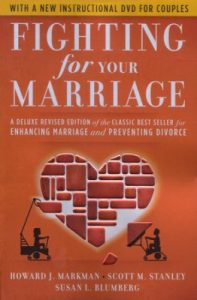Fighting for Your Marriage (3rd ed.)
 Marriages today “require more skill in communication, conflict management and negotiation between partners than ever before,” says the revised edition of “Fighting for Your Marriage” published in 2010. In part, these negotiations are made necessary by “the higher expectations couples now have for the positive sides of their relationships,” the book explains.
Marriages today “require more skill in communication, conflict management and negotiation between partners than ever before,” says the revised edition of “Fighting for Your Marriage” published in 2010. In part, these negotiations are made necessary by “the higher expectations couples now have for the positive sides of their relationships,” the book explains.
This is the third edition of the popular book on enhancing marriage and preventing divorce, first published in 1994 by Howard J. Markman, Scott M. Stanley and Susan L. Blumberg, marriage researchers based in Denver.
In one of its central points, the book encourages couples to push themselves “to engage in positive behaviors, especially when they are not happening naturally.” Recent marriage research prompted the authors to “focus much more attention” in this edition on how couples can “accentuate the positives and work on defeating the power of the negatives” in their life together.
The new edition also highlights the importance of having fun. “Although it may seem obvious that fun is important,” the authors say that “until recently most relationship research and books for couples widely ignored” this. It now is known, however, “that the more that fun and friendship are a part of your lives together, the happier you will be in your marriage,” they tell couples.
It is also important that a husband and wife think of themselves as a team. Conflict is more likely for spouses when they “see problems as ‘me against you’ instead of ‘us against the problem,’” the authors note. They report that their research clearly shows “that couples who are thriving in their marriages have a strong sense of ‘us.’”
After more than three decades of research on marriage, the authors have learned “that success in marriage is related not so much to the nature of the differences between two partners as to how the partners handle the differences they have.” Of course, they add, this does not mean “that differences don’t matter.”
But when differences and difficulties in marriage are handled poorly over time, a husband and wife may come to feel that they “are walking in a minefield,” the authors say. They consider this “one of the most destructive things that can happen to a marriage.” They believe, though, that no marriage ever has to “get to be this way.”
“Ground rules” the authors propose for discussing difficult matters may be one of this book’s most beneficial sections. The ground rules are designed to help couples handle topics that might otherwise lead to greater conflict.
Taking a time out when conflict escalates, separating the discussion of problems from their solution and assuring that conflict does not become part of times reserved for “fun, friendship, support and sensuality” are among the authors’ suggested ground rules.
“Fighting for Your Marriage” says that “the key to preventing marital distress, divorce and unhappiness” is “to reduce the risk factors and to increase the protective factors.” Protective factors include “all the good things in relationships – friendship, fun, spiritual and religious involvement, and aspects of commitment.”
This book offers instruction in what the authors call the “speaker-listener technique,” which is a method couples can use to communicate “more safely and slowly when discussing something” that is difficult for them or that perhaps makes them angry. To illustrate the technique in action, the authors present numerous husband-wife discussions.
There is a “recipe for a great relationship,” according to “Fighting for Your Marriage.” The recipe “includes a cup of love, a cup of commitment, several tablespoons of compatibility of interests, a cup and a half of skill in handling conflicts and a pinch of magic.”
The authors are convinced that “most divorces and most marital unhappiness can be prevented,” and that a husband and wife can learn “to build and protect a great relationship” if they “are motivated to do so.”
About the reviewer
David Gibson is the former, now-retired editor of Origins, CNS Documentary Service.
Disclaimer: Book reviews do not imply and are not to be used as official endorsement by the USCCB of the work or those associated with the work. Book reviews are solely intended as a resource regarding publications that might be of interest to For Your Marriage visitors.




